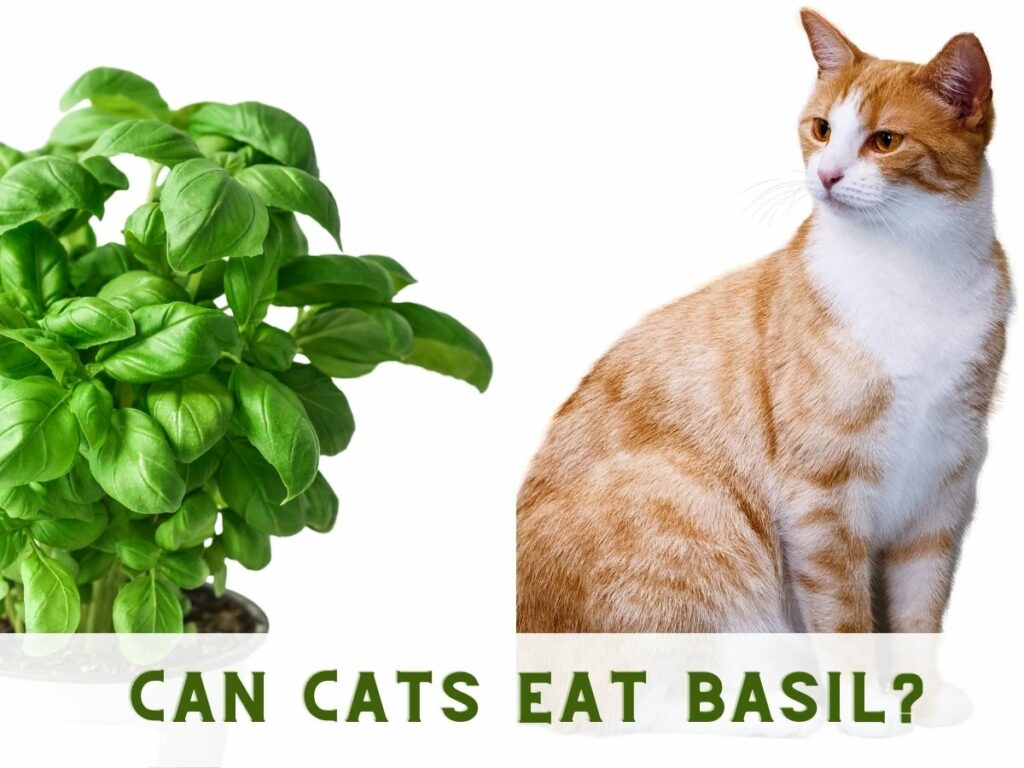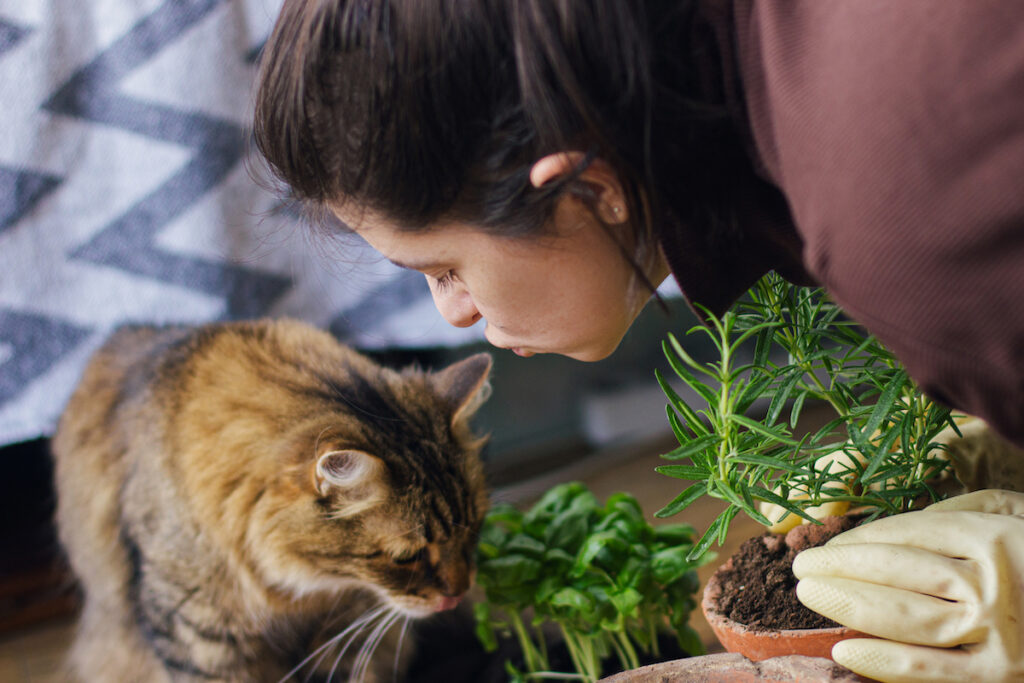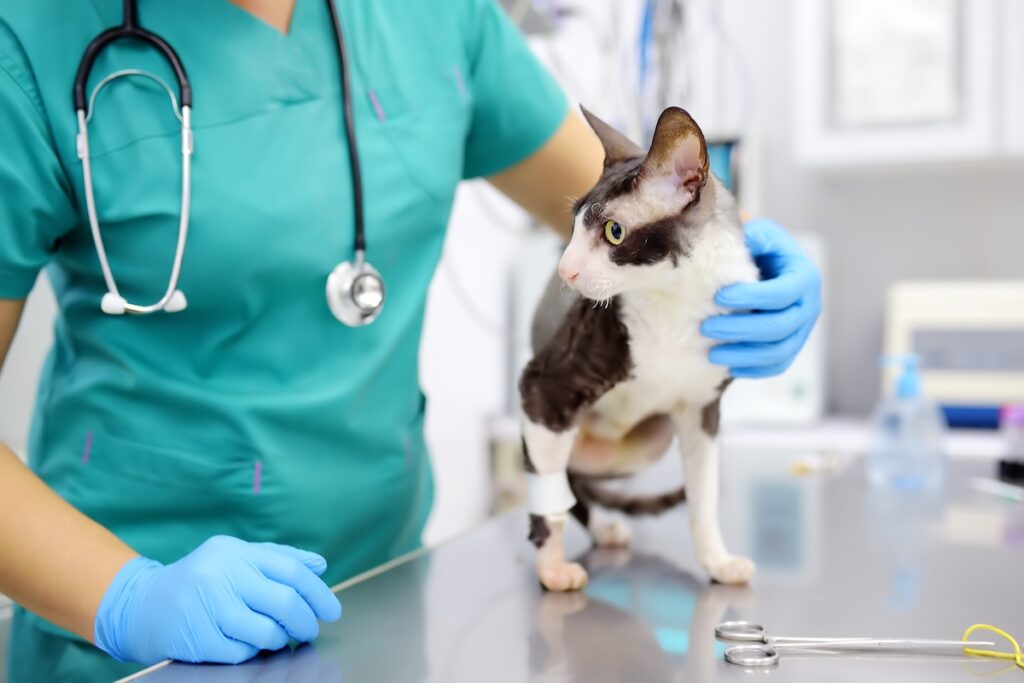As an Amazon Associate I earn from qualifying purchases. This website also participates in other affiliate programs and may earn commissions if you shop through the links used on this website.
(This article was originally published on July 20, 2022 and was last updated on August 10, 2022)
You know that phrase, curiosity killed the cat?
Turns out, it’s pretty true. Cats are very curious animals. And they seem to love exploring the plant world, experimenting with certain plants as food. While curiosity, exploration, and nibbling plant life is just part of being a cat, unfortunately some plants are life-threatening to our cats.
If you have a herb garden on your property or nearby, or regularly grow potted basil on your windowsill or in your kitchen, you might be wondering…is basil safe for cats?

Maybe your feline friend is attracted by the smell of your basil plants, rub up against them, and even tries to taste a bit. Or maybe your cheeky buddy jumped onto the counter and absconded with your cheese and basil toastie.
Whatever the reason, it’s worth digging into the question whether cats can eat basil or not.
Is basil toxic to cats, or safe?
DISCLAIMER: This blog post is not intended to be veterinary or professional advice. If in doubt, speak with your veterinarian about your pet.
Can Cats Eat Basil? Is Basil Safe and Non Toxic to Cats?
In most situations, yes, healthy cats can eat fresh or dried basil. Basil is non toxic to cats, meaning it’s probably okay if your cat eats a little bit of basil. Whether it is dried basil or fresh basil, basil is considered safe for cats, and consuming it should not harm your pet. However, make sure that your cat does not eat basil in large quantities, and look out for signs of allergy or digestive upset.
If your cats eat basil that’s been cooked in a recipe, the basil itself is not toxic to them, but you’ll need to check safety of the other ingredients as well. Onions and garlic, for example, are often used in recipes with basil, and both are poisonous to cats.
Furthermore, basil essential oil is not safe for cats, and can cause liver damage in cats. If your cat or another pet consumes essential oil, call your vet.
If you you’ve been instructed by your vet to monitor your cats potassium levels, speak to your vet if your cat consumes basil. Basil’s potassium content varies based on whether it’s fresh (~3 mg per gram of fresh basil leaves) or dry (~26 mg of potassium per tablespoon of dried basil), whereas a healthy cat’s daily allowance for potassium is 0.33 grams.
Possible Health Benefits of Basil for Cats
Cats are obligate carnivores (unlike guinea pigs and rabbits), which means they rely entirely on animal flesh to meet their dietary needs, don’t need vegetables or plants added to their diet to meet nutritional needs, and their digestive system is best adapted to meat.
That said, we’ve all seen cat munching on certain plants in the garden before, including cat grass and cat nip. Clearly they enjoy munching on some plants!

While basil has a number of health benefits for humans, your cat is much less likely to benefit from these nutrients than you are, since their stomach and digestive system isn’t as well adapted to breaking down plant material, compared to meat. That means cats cannot extract the nutrients in basil plant fiber the same way humans can, and don’t get the same benefits as we do, rendering basil not particularly beneficial for felines.
That said, it’s possible cats can absorb a tiny amount of the nutritional benefits of basil leaves, including Vitamin A, calcium, antioxidants, and anti inflammatory properties.
In other words? Don’t go out of your way to feed your cat basil for the health benefits, and never try to replace your cat’s diet of meat and seafood (aka: cat food) with one of plants and herbs, including basil.
Antioxidants
Cats might benefit slightly from the antioxidants in basil. In particular, the antioxidants contained in basil could help cats with arthritis or other diseases of aging.
Calcium
The basil plant is very high in calcium, which is a necessary nutrient for the normal development of bones in both people and felines.
Vitamin A
Basil leaves are a source of Vitamin A, which is essential for eye health. Although cats have an excellent low light vision, vitamin A can help maintain a cat’s eye health.
Bottom line?
Should you feed your cat basil for beneficial nutrition gains? No – their stomach and digestion aren’t set up to get a lot of nutritional benefit out of plants.
But is it okay if your cat eats a bit of pure basil leaf? Most likely.
Risks / Negative Side Effects of Cats Eating Basil
Basil is not poisonous and is generally safe for healthy cats as fresh leaves, dried basil, and cooked basil – so long as it hasn’t been cooked with other ingredients that are toxic to cats.
That said, just because your cat can eat basil, that doesn’t mean it should or that it’s completely safe for all cats.
The biggest risk of consuming basil is stomach upset – vomiting, diarrhea, or an otherwise upset stomach are common unpleasant side effects of cats eating too much basil.
Another risk is allergic reaction. While basil allergies in cats aren’t unheard of, they thankfully only occur in rare cases. If your cat gets into your basil garden, watch for any concerning signs (hives, swelling, vomiting, etc.) or behaviour changes for the next 24 hours, just in case.
If your kitty has any health concerns, seek veterinary guidance if your cat eats basil unexpectedly, and don’t offer your cat basil or add it to their diet without first speaking with your vet.

Frequently Asked Questions
Are Cats Attracted To Basil?
Basil is a member of the Lamiaceae family of plants (the mint family) which also includes the herb catnip and catmint (as well as other culinary herbs such as thyme, sage, rosemary), which cats tend to gravitate towards.
Cats tend to like and be attracted to the smell of basil, and generally love to explore gardens and plants, rubbing up against plants, smelling them, and maybe even taking a nibble.
While you may find your kitty is curious about your basil plants, they’re unlikely to be attracted to basil as much as they are to catnip or cat grass.
Do Cats Like the Taste of Basil?
Cats, like humans, have individual preferences. While some cats couldn’t care less about basil, others seem to enjoy basil, or even love it.
Why some cats like the taste of basil is an interesting lesson in cat biology.
Whereas humans have roughly 9,000 taste buds on our tongues, cats have less than 500. Of particular relevance to tasting basil, cats don’t have sweet-distingushing tase buds. They can only sense sour, bitter, salty and savoury.
While cats lack the ability to taste sweet, they do have an additional way of tasting via the unique Jacobson’s organ on the roof of a cat’s mouth, which lets them “taste via smelling.” By inhaling the aromas of a food, the organ helps cats taste the smell of a food.
This could explain why your kitty is attracted to the strong aroma of the fresh basil leaves in your garden!
If you do happen to have one of those basil-loving cats, make sure they only consume tiny amounts daily, and keep an eye out to make sure they don’t experience unpleasant digestive side effects after they much.
Can Cats Eat Basil Pesto?
No, cats cannot eat basil pesto.
Common ingredients in pesto – in particular garlic – are toxic to cats (and dogs).
Alliums, which includes garlic, shallots, onions, and scallions, are toxic to cats (and some other pets) in large quantities or concentrations (i.e. dried powder or seasoning). They can harm red blood cells and cause anemia in felines.
While pesto is wonderful for human consumption, do not feed your cat (or other pet) pesto. If your cat or another pet does eat basil pesto, watch for symptoms and call your vet immediately for professional veterinary advice.
Sandra is an undergraduate in Veterinary Science, completing her final year of study before graduating as a Veterinarian. An active member of the International Veterinary Students’ Association, Sandra has also completed veterinarian summer school training in Sarajevo, Bosnia-Herzegovina, and Vienna, Austria. Sandra loves small animals, and is also a fan of basil!

